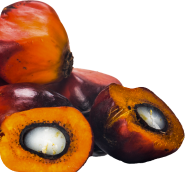
The palm oil industry has faced sustainability issues in the past, but it has recently made major strides towards turning this around.
Sustainable palm oil production is the production of palm oil that meets the environmental, social, and economic standards set by the Roundtable on Sustainable Palm Oil (RSPO) as well as national bodies like the Indonesian Sustainable Palm Oil (ISPO) and the Malaysian Sustainable Palm Oil (MSPO) certification schemes. Indonesia and Malaysia are the two largest palm oil producing countries.
The RSPO is a global non-profit organization that brings together stakeholders from across the palm oil supply chain to develop and implement these standards.
The RSPO Principles and Criteria for Sustainable Palm Oil (P&C) cover a wide range of issues, including environmental protection, including the requirement that palm oil is produced in a way that minimizes deforestation, peatland conversion, and biodiversity loss.
Certified sustainable palm oil is becoming increasingly popular with consumers and businesses who are looking to reduce their environmental impact.
The industry has turned to technology to boost both sustainability and productivity and ensure that there is an adequate supply of sustainably sourced palm oil. From precision agriculture to blockchain, technology is revolutionizing the way the crop is produced, processed, and traced.
- Fractional technology
Palm oil fractionation technology is a process that separates palm oil into different fractions with different melting points. This is done by cooling the palm oil to a controlled temperature, allowing the different fractions to crystallize, and then separating the crystals from the liquid oil.
The different fractions of palm oil have different properties and are used for different purposes. The liquid fraction, called olein, is used in food products such as margarine, shortening, and salad oil. The solid fraction, called stearin, is used in products such as cosmetics, candles, and soap.
Palm oil fractionation technology is a relatively new process, but it is becoming increasingly important as the demand for palm oil grows. This is because it allows producers to produce different fractions of palm oil that are better suited for specific applications.
There are the different types of fractionation of palm oil:
- Fast dry process: This is the most common type of fractionation process. It is a relatively simple process that uses a vacuum to remove moisture from the palm oil. The palm oil is then cooled to a controlled temperature and the different fractions are separated.
- Slow dry process: This process is similar to the fast dry process, but it uses a lower temperature and a longer time period. This results in a higher quality product, but it is also a more expensive process.
- Detergent process: This process uses a detergent to help separate the different fractions of palm oil. This process is more expensive than the other two processes, but it can produce a higher quality product.
The choice of fractionation process depends on the desired quality of the product and the cost constraints.
The advantages of palm oil fractionation technology include:
- It allows producers to produce different fractions of palm oil that are better suited for specific applications.
- It can improve the quality of palm oil products.
- It can help to reduce the waste of palm oil.
Palm oil fractionation technology is a valuable tool that can help to improve the production and use of palm oil. However, it is important to consider the costs and environmental impacts of the process before implementing it.
- Precision Agriculture
Precision agriculture, powered by technology, is transforming palm oil cultivation. Drones and satellite imagery can monitor plant health, detect diseases, and optimize fertilizer and water usage. This helps minimize environmental impact, reduce input wastage, and increase crop productivity, all of which promotes sustainable practices within the palm oil industry. Examples can be found here, here, and here.
- Digitalization
Technology plays a pivotal role in enhancing transparency within the palm oil supply chain. Blockchain solutions enable real-time tracking and traceability of palm oil, from plantation to consumer. This ensures that sustainable and ethical practices are adhered to at every stage. By providing transparent information on sourcing, processing, and certifications, blockchain solutions enable consumers to make informed choices and support sustainable palm oil production. Examples can be found here and here.
- Smart Milling
Smart milling is revolutionizing palm oil processing. Automated systems and machine learning algorithms enable efficient extraction of oil from fresh fruit bunches. This reduces processing time, energy consumption, and waste generation. By optimizing processing efficiency, smart milling contributes to sustainable production practices and enhances overall productivity. Examples can be found here and here.

- Data Analytics
The Internet of Things (IoT) and data analytics are empowering the palm oil industry to make informed decisions. Connected sensors and data-driven analytics provide real-time insights on plantation conditions, weather patterns, and machinery performance. This enables proactive decision-making, improving yield forecasts, resource allocation, and maintenance scheduling. By leveraging IoT and data analytics, the industry can enhance operational efficiency, reduce environmental impact, and optimize productivity.
- Research and Development: Innovating for Sustainability
The palm oil industry is investing in research and development to drive technological innovations further. Collaboration between industry, researchers, and technology companies fosters innovation in areas like genetic engineering, sustainable pest control, and waste management. These advancements minimize environmental impact, enhance yield, and promote sustainable practices throughout the palm oil value chain.
The palm oil industry’s embrace of technology is propelling sustainable practices and transforming the way palm oil is produced and processed. Precision agriculture, blockchain solutions, smart milling, IoT, and data analytics are just a few examples of the technological advancements driving the industry’s sustainability agenda.
By harnessing technology, the industry can optimize resource efficiency, enhance transparency, and improve decision-making. As the palm oil industry continues to embrace technology and invest in research and development, it paves the way for a more sustainable and technologically advanced future.